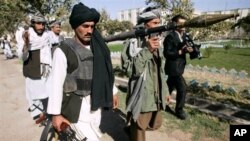Occupying a strategic geopolitical position as the crossroads of Central Asia once made Afghanistan a focal point for governments competing for economic, political, and diplomatic dominance in the region. This competition, dubbed the Great Game, is now being replayed in a new 21st century version, but with some of the same nations participating, but this time, they are playing for different - and higher - stakes than some 150 years ago.
Professor Larry Goodson of the U.S. Army War College says that with the U.S. pondering its eventual troop withdrawal from Afghanistan, many countries are looking to see how they can extend their influence there.
Since there is a 21st-century Great Game going on in Afghanistan, a number of other regional actors - China, India, Russia, the Arabian Gulf countries, and then the United States and NATO, not a regional actor but engaged very heavily in Afghanistan - are all engaged and are all supporting different local proxies that can carry forward the interests of the outside actor," said Professor Goodson.
Some are backing the U.S. effort and Afghan President Hamid Karzai. Some are backing the Taliban. But Afghanistan's closest neighbors appear to be betting to some extent on both.
Jim Dobbins, director of the International Security and Defense Policy Center at the RAND Corporation, says Pakistan is playing both sides.
"There's no doubt that Pakistan has a very complicated set of policies and self-perceived interests which do result in its playing a double game, on the one hand insisting that they're part of the U.S.-led coalition to stabilize Afghanistan and on the other hand, tolerating and perhaps even directly assisting Taliban leadership that operates from a sanctuary in Pakistan, " said Dobbins.
Officially, Pakistan says it supports U.S.-led efforts in Afghanistan and denies any backing for the Pakistani Taliban or other militant groups. But analysts say India's influence in Afghanistan is growing, and Larry Goodson says Islamabad sees using militant groups as a way of battling that and keeping India preoccupied in Kashmir.
"You can't really tell a country, 'you should give up your tools of national security policy that work.' They might say, 'yes, what an excellent idea, we'll do it immediately,' but you shouldn't then believe that they're actually going to do it," he said. "So I don't think that it's reasonable for us to really expect Pakistan to change what it's done, in part because its national security leadership has grown up knowing that these were tools of national security policy."
Jim Dobbins, a veteran diplomat who helped negotiate international agreements on Afghanistan, says Iran is also hedging its bets. He says Iran does not want to be completely locked out of influence in neighboring Afghanistan, and also finds it convenient to make life uncomfortable for the U.S. and NATO troops there. But, he adds, it also wants stability and has strongly supported President Karzai.
"So they've maintained low-level contacts and provided very limited levels of support to some insurgent groups," he said. "But the dominant effort has been to bolster Karzai. They are a major aid donor, and they've been quite consistent in supporting Karzai and supporting Karzai's initiatives. So, I think on balance, they are not the most problematic of Afghanistan's neighbors. From the American standpoint, the most problematic is still Pakistan."
For its part, analysts say, China is worried about any spread of militant Islam out of Afghanistan to its own Muslim regions. And Russia, they add, wants not only to halt any export of militancy, but also would like to minimize U.S. influence in Central Asia, which has spread alongside American logistical needs in region, such as air bases, to supply the effort in Afghanistan.
Jim Dobbins says that for any political settlement the Afghans reach with insurgents to end the conflict to hold, it will need wide international support.
"There are other players who have their own views, their own objectives - the Indians, the Iranians, the Russians, the Americans - and any settlement is going to have to satisfy all of them if it's going to stick," said Dobbins. "I think you can imagine an outcome of this game which stabilizes and pacifies Afghanistan, but that's far from certain. And it will require a great deal of effort and diplomatic skill on the part of the United States, which is still the single most powerful player in this game."
The Obama administration is currently engaged in a policy review that will have a strong impact on the timetable and pace of the U.S. troop withdrawal from Afghanistan, which is scheduled to at least partially begin in July, 2011.




